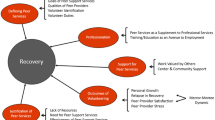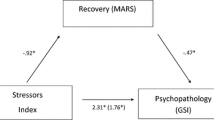Abstract
The inclusion of peer providers – individuals in recovery from mental health problems as service providers – is now a common practice across mental and behavioral healthcare settings. Known by various titles (e.g., peer specialists, consumer providers, recovery coaches, family support providers), these individuals use their lived experiences to assist others to cope with mental illnesses and to navigate highly complex behavioral health, primary care, and associated social service systems.
There has been significant growth of such approaches and all states have developed or are implementing peer specialist programs, often with extensive training and certification initiatives. Over 25,000 individuals are working as peer specialists, of whom many received Medicaid reimbursement for their services. The National Association of Peer Specialists is a national trade organization for this specialty profession. The Veterans Health Administration employs over 1100 peer specialists across their services.
This chapter reviews the development of this profession, the evidence for peer-provided services, and the roles and settings where such services are provided. A major focus is on how community psychiatrists work with peer providers to promote recovery from mental illnesses. Challenges and solutions to successfully implementing peer specialist initiatives are addressed.
Access this chapter
Tax calculation will be finalised at checkout
Purchases are for personal use only
Similar content being viewed by others
References
Acri M, et al (2016). Peer models in mental health for caregivers and families, Community Mental Health Journal, 53:241–249.
Adams W (2020). Unintended consequences of institutionalizing peer support work in mental healthcare. Social Science & Medicine 262.
Bellamy C, et al (2019). Peer support on the “inside and outside”: building lives and reducing recidivism for people with mental illness returning from jail. Journal of Public Mental Health, 18(3):188–198.
Berrenger, S, et al (2019). Enacting lived experiences: Peer specialists with criminal justice histories. Psychiatric Rehabilitation Journal, 42(1):9–16.
Chamberlin J: (1978). On Our Own: Patient-controlled alternatives to the mental health system, New York City, McGraw-Hill.
Chinman, M, Young, AS, Hassell, J, Davidson L (2006). Toward the implementation of mental health consumer provider services. Journal of Behavioral Health Services & Research 33(2):176–195.
Chinman M, Hamilton A, Butler B et al (2008). Mental Health Consumer Providers: A Guide for Clinical Staff, Santa Monica, CA, Rand Corporation.
Chinman M. et al (2017). Establishing a research agenda for understanding the role and impact of mental health peer specialists. Psychiatric Services. 68(9): 955–957.
Clay S (ed) (2005). On Our Own, Together, Nashville, TN, Vanderbilt University Press.
Cook J, Jonikas J (2020). The importance of psychiatric rehabilitation services during and after the COVID-19 pandemic. Psychiatric Services 71(9):883–884.
Cronise R, et al (2016). The peer support workforce: Results of a national survey. Psychiatric Rehabilitation Journal 39(3):211–221.
Daniels A, Daniels A., Grant E, Filson B, Powell, I., et al (2009). Pillars of Peer Support: Transforming mental health systems of care through peer support services. Available at www.pillarsofpeersupport.org. Accessed August 26, 2020.
Daniels A, et al (2017). Defining peer roles and status among community health workers and peer support specialists in integrated systems of care. Psychiatric Services 68(12):1296–1298.
Davidson L, et al (2012). Peer support among persons with severe mental illnesses: A review of evidence and experience. World Psychiatry 11(2):123–128.
Druss B, et al (2018). Peer-led self-management of general medical conditions for patients with serious mental illnesses: A randomized trial. Psychiatric Services 69(5):529–535.
Ellison M, et al (2020). Impact of peer specialist services on residential stability and behavioral health status among formerly homeless veterans with co-occurring mental health and substance use conditions. Medical Care 58(4):307–313.
Fortuna K, et al (2019). The future of peer support in digital psychiatry: Promise, progress, and opportunities. Current Treatment Options in Psychiatry 6:221–231.
Gates LB, Akabas SH (2007). Developing Strategies to Integrate Peer Providers into the Staff of Mental Health Agencies. Administration and Policy in Mental Health and Mental Health Services Research, 34:293–306.
Government Innovators Network, Harvard Kennedy School (1991). Consumer Case Management Aid Program. Available at https://www.innovations.harvard.edu/consumer-case-manager-aide-program. Accessed August 26, 2020.
Institute of Medicine (2006). Improving the Quality of Health Care for Mental and Substance Use Conditions, National Academies Press: Washington, DC.
Job Accommodation Network (2010). Job Accommodations for People with Mental Health Impairments. Washington, D.C., U.S. Department of Labor.
Jones N, et al (2019). Peer specialists in community mental health: Ongoing challenges of inclusion. Psychiatric Services 70(12).
Joo J, et al (2016). An innovative model of depression care delivery: Peer mentors in collaboration with a mental health professional to relieve depression in older adults. The American Journal of Geriatric Psychiatry 42(5):407–416.
Myrick K, del Vecchio P (2016). Peer support services in the behavioral healthcare workforce: state of the field. Psychiatric Rehabilitation Journal, 39(3):197–203
National Association of Peer Specialists (2010). Available at https://www.inaops.org/. Accessed August 26, 2020.
New Freedom Commission on Mental Health (2003). Achieving the Promise: Transforming Mental Health Care in America. Final Report (DHHS Pub. No. SMA-03-3832), Rockville, MD.
Ojeda V, et al (2020). The availability of peer support and disparities in outpatient mental health service use among minority youth with serious mental illness. Administration and Policy in Mental Health and Mental Health Services Research, July 29.
Pitt V, et al (2013). Consumer-providers of care for adults clients of statutory mental health services. Cochrane Database of Systematic Reviews, Issue 3, Art. No: CD004807. Available at https://www.cochranelibrary.com/cdsr/doi/10.1002/14651858.CD004807.pub2/information. Acccessed August 26, 2020.
Pulice, Richard T, Miccio, S (2006). Patient, client, consumer, survivor: The mental health consumer movement in the United States in Community Mental Health: Challenges for the 21st Century Edited by Rosenberg J, Rosenberg S, Routledge, pp. 7–14.
Rogers ES, et al (2007). Effects of Participation in consumer-operated service programs on both personal and organizationally mediate empowerment: Results of multisite study. Journal of Rehabilitation Research and Development, 44:785–800.
Sells D, Davidson L, Jewell, C et al (2006). The Treatment Relationship in Peer-based and Regular Case Management for Clients with Severe Mental Illness. Psychiatric Services, 57:1179–1184.
Silver, J, Nemec P (2016). The role of the peer specialists: Unanswered questions. Psychiatric Rehabilitation Journal 39(3):289–291.
Smith, D (2007). State Medicaid Director Letter # 07-011. Baltimore, MD, Centers for Medicaid and Medicare Services. Available at https://downloads.cms.gov/cmsgov/archived-downloads/SMDL/downloads/SMD081507A.pdf. Accessed August 26, 2020.
Solomon P (2004). Peer Support/Peer-provided Services: Underlying processes, benefits, and critical ingredients. Psychiatric Rehabilitation Journal, 27(4):392–402.
Substance Abuse and Mental Health Services Administration (2011). Consumer-Operated Services Evidence-Based Practices (EBP) Kit. Rockville, MD, SAMHSA. Available at https://store.samhsa.gov/product/Consumer-Operated-Services-Evidence-Based-Practices-EBP-KIT/SMA11-4633. Accessed August 26, 2020.
Substance Abuse and Mental Health Services Administration (2012). National Consensus Statement on Mental Health Recovery. Rockville, MD, SAMHSA,
Substance Abuse and Mental Health Services Administration (2015). Core competencies for peer workers in behavioral health services. Rockville, MD, SAMHSA. Available at https://www.samhsa.gov/sites/default/files/programs_campaigns/brss_tacs/core-competencies_508_12_13_18.pdf. Accessed August 26, 2020.
Substance Abuse and Mental Health Services Administration (2020a). State-by-State Directory of Peer Recovery Coaching Training and Certification Programs, Rockville, MD: SAMHSA. Available at https://c4innovates.com/brsstacs/BRSS-TACS_State-by-State-Directory-of-Peer-Recovery-Coaching-Training-and-Certification-Programs_8_26_2020.pdf. Accessed by September 3, 2020.
Substance Abuse and Mental Health Services Administration (2020b). Shared Decision Making Tools. Rockville, MD, SAMHSA. Available at: https://www.samhsa.gov/brss-tacs/recovery-support-tools/shared-decision-making. Accessed August 26, 2020.
Substance Abuse and Mental Health Services Administration (2020c). Participatory Dialogues. SAMHSA: Rockville, MD. Available at https://www.theweb.ngo/history/Docs/SAMHSADialogue.pdf. Accessed August 31, 2020.
University of California, San Francisco (2010). Rx for Change: for mental health peer counselors. Available at: http://rxforchange.ucsf.edu/about.php. Accessed August 26, 2020.
US Department of Health and Human Services: Mental Health (1999). A Report of the Surgeon General. Rockville, MD, Substance Abuse and Mental Health Services Administration.
Van Tosh, L, del Vecchio P (2001). Consumer/Survivor-Operated Service Programs: A Technical Report, Rockville, MD, Substance Abuse and Mental Health Services Administration.
Wallcraft J, Schrank B, Amering, M (2009). Handbook of Service User Involvement in Mental Health Research, West Sussex, UK, Wiley-Blackwell.
Willging C, et al. (2016). Coaching mental health peer advocates for rural LGBTQ people, Journal of Gay & Lesbian Mental Health 20(3):214–236.
Woodhouse A, Vincent A (2006). Mental health delivery plan—development of peer specialist roles: A literature scoping exercise. Edinburgh, Scotland, Scottish Recovery Network and the Scottish Development Centre for Mental Health.
Author information
Authors and Affiliations
Corresponding author
Editor information
Editors and Affiliations
Rights and permissions
Copyright information
© 2022 The Author(s), under exclusive license to Springer Nature Switzerland AG
About this chapter
Cite this chapter
del Vecchio, P. (2022). Peer Service Providers as Colleagues. In: Sowers, W.E., McQuistion, H.L., Ranz, J.M., Feldman, J.M., Runnels, P.S. (eds) Textbook of Community Psychiatry. Springer, Cham. https://doi.org/10.1007/978-3-031-10239-4_38
Download citation
DOI: https://doi.org/10.1007/978-3-031-10239-4_38
Published:
Publisher Name: Springer, Cham
Print ISBN: 978-3-031-10238-7
Online ISBN: 978-3-031-10239-4
eBook Packages: Behavioral Science and PsychologyBehavioral Science and Psychology (R0)




